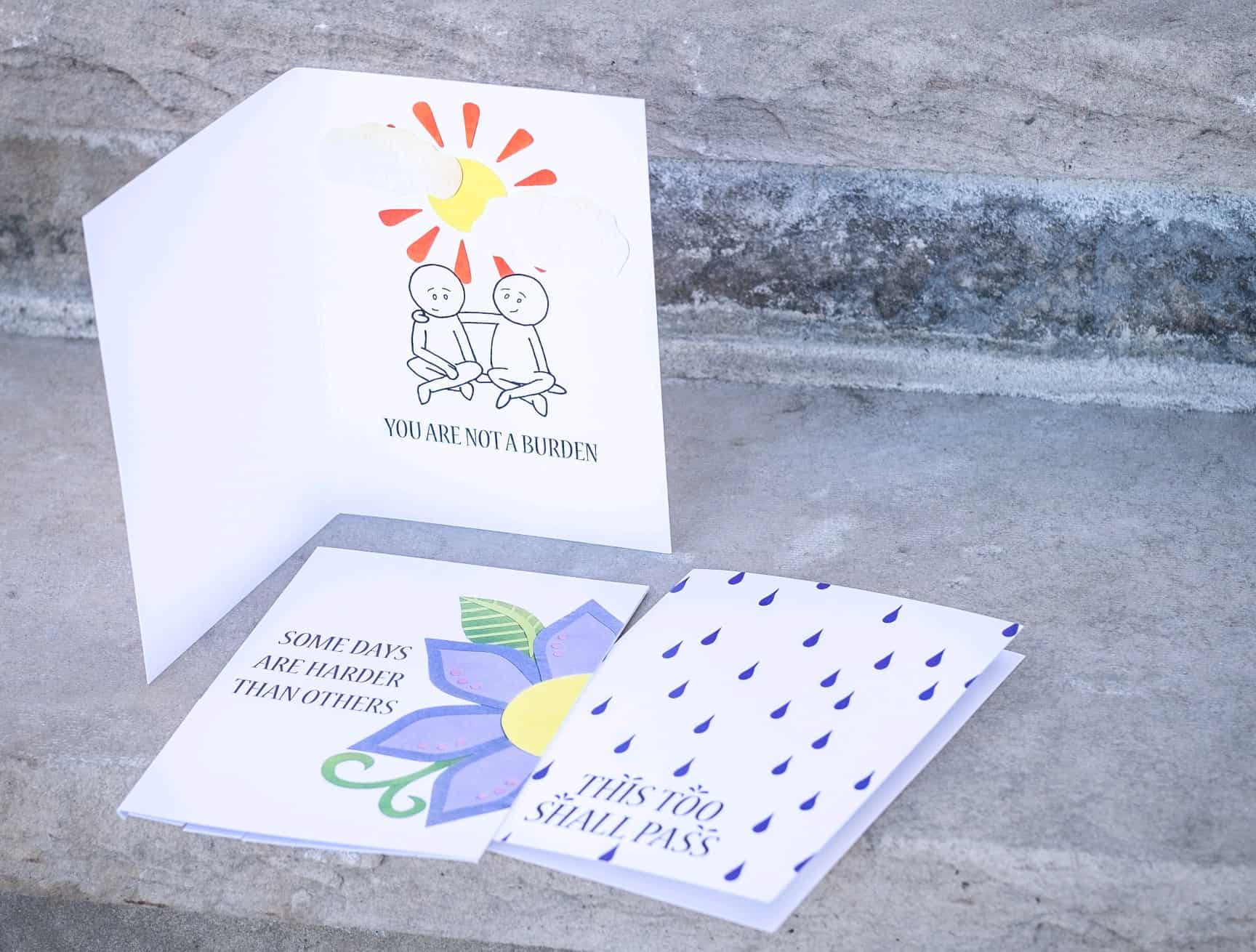If you’re struggling with mental illness, you’re not alone, though you may feel compelled to withdraw.
“I have times where I seclude myself,” says Liane Daiter, 30, an occupational therapist, mental health consumer, and owner of Toronto-based small business, With Love Compassion Cards. “Depending on what I’m going through, sometimes taking a bit of space away is helpful.”
In March 2016, Daiter reached out to the Bunz community with a special offer. “I said ‘Hey, I’m going through a really tough time and I made some cards and I would love to give them to someone else who’s also going through a tough time,’” she recalls. The three illustrated cards read, “Anxiety sucks,” “Depression sucks,” and “I like you just the way you are.”

Liane Daiter (credit: Yehuda Fisher)
After Daiter gave these three cards to three strangers, she received 400 responses with people on Bunz telling her to “move forward with this” and “This is so needed.” With this encouragement, as well as an available space to sell her cards at the DesignNook, she launched With Love Compassion Cards.
The company quickly expanded to include wedding, birthday, thank you, love/friendship, and special occasions cards, though the mental health cards remain the most popular. These cards not only help Daiter to spread empathy and wordplay, but the act of creating them contributes to her personal wellness: “I have an eating disorder, and keeping busy with my hands is very healthy for me. It distracts me away from disordered thoughts.” Another major motivating factor was the need to vocalize the very messages she wanted to receive. “A lot of the initial cards were things I needed to hear when I wasn’t doing well.”
Kat Singer’s “Love Letters to Myself” project was born out of a similar desire. “I had a chance to use a laser cutter to make a few stencils of the things I really, really needed to hear,” says the 30-year-old Toronto artist of the stencilled, spray-painted messages of hope, tagged on sidewalks around the city.
“Honour Your Discomfort” was one of the first ones Singer created back in October 2016. “I was learning boundaries and how important it is to say no,” Singer explains. Another one of the initial stencils read, “‘It Doesn’t Have to be Perfect’ because perfectionism is still one of my biggest struggles,” says the recent graduate of York University’s Fine Arts program.
Singer has recently created new stencils for their collection: “‘All bodies are good bodies’ is one of them, since I’m still coming to terms with having a chronic condition that leaves me tired and in pain a lot of the time, and I feel like my body sometimes is against me. But I don’t need to attack my body to feel worthy,” says Singer.
The reaction to the series has been profoundly positive: “A couple of people have reached out to me privately and said, ‘You know what? Your tag made my day and it made me feel better. And it was there for me in the right moment.’ And that’s pretty much all I aspire to do and to be.”
Singer is also the creator of the Message in a Bottle project that looks at the personal narratives of individuals who take medication, an act the artist is working to de-stigmatize. Participants are asked to send in their empty prescription bottles with as much or as little of their personal information blackened out as possible, along with a statement on living with their invisible or visible illness.
“This project resonated with a lot of people. It was interesting how people wanted to be more out about their personal stories,” Singer says.

Kat Singer “Patron Saint” (credit: Kat Singer)
Sharing these types of personal stories is one of the crucial next steps Daiter believes is necessary for awareness campaigns like the Canadian Mental Illness Awareness Week to be effective. “The face of mental health issues is not the one always smiling for the media,” she says, explaining that mental health awareness campaigns rarely focus on the painful reality of living with schizophrenia, psychosis, eating disorders and suicidal ideation. “I find a lot of the campaigns water down what it is actually like to have mental health issues.”
Daiter also strongly advocates for more government funding to reduce the huge gap in the mental health field to provide people with long-term, free therapy, while Singer underscores the importance of acceptance: “I want people to accept that our brains are all different and that there are different levels of functioning. I want society to stop focusing on pathologizing individuals. Instead of focusing so much on mental illness, we should focus on mental wellness.”
With Love Compassion cards are available here and at DesignNook, (2038 Danforth), and Old’s Cool General Store (250 Westlake Ave). Follow the Love Letters to Myself project here. Participate in the Message in a Bottle Project here.




 Follow Us On Instagram
Follow Us On Instagram
